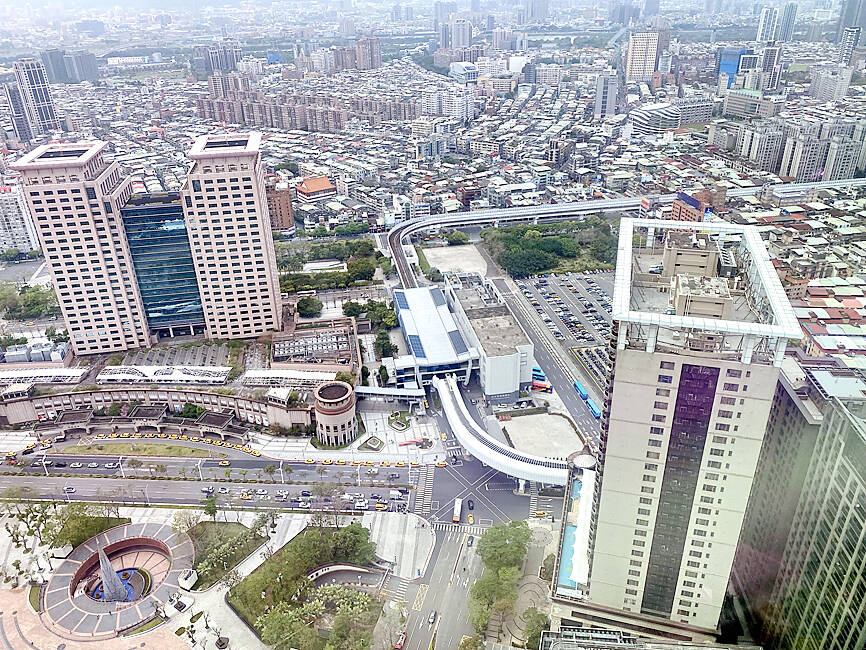Property tax revenue for last quarter declined 12 percent year-on-year to NT$6.42 billion (US$210.53 million), as economic weakness and interest rate hikes dampened buying interest, analysts said yesterday.
The retreat was in line with a slowdown in property transactions, but remained the second-highest quarter behind that of the same period a year earlier, Great Home Realty Co (大家房屋) head researcher Mandy Lang (郎美囡) said.
The extension of property taxes to presale contract transfers in July 2021 has bolstered the tax category in the past two years, Lang said.

Photo: CNA
The revisions also expanded the definition of short-term speculation from two years to five years upon resale of real estate, significantly raising the number of taxable cases, she said.
Tainan recorded the steepest decline of 33.8 percent among the six special municipalities, followed by Taipei’s 25.8 percent decrease and Taichung’s 23.8 percent reduction, she said.
However, New Taipei City, Taoyuan and Kaohsiung bucked the trend registering year-on-year property tax gains of 7.7 percent, 10.8 percent and 7.8 percent respectively, she said.
Sellers should have exited the market with small gains or without capital losses unless they bought at record-high prices, Lang said.
Housing prices have soared in Taichung, Tainan and Kaohsiung in the past few years on the back of improving infrastructure and major tech firms’ construction of new manufacturing facilities.
H&B Realty Co (住商不動產) research chief Jessica Hsu (徐佳馨) said she doubted that property tax revenue would continue to climb in the near term, with interest rates rising above 2 percent and bans on the transfer of presale home purchase agreements approaching.
Policymakers have reiterated their intent to facilitate a soft landing on high property prices and might introduce more unfavorable measures to accomplish that goal, Hsu said.
In related news, a high percentage of resold homes in the past two years were exempt from property taxes despite spikes in real-estate prices, Sinyi Realty Co (信義房屋) said.
In 2021, 54,000 resold homes, or 31.55 percent of overall deals, were exempted from property taxes, likely as they were sold due to job relocation, Sinyi Realty research manager Tseng Ching-der (曾敬德) said.
The ratio of exemptions reached 25 percent last year, which was also high in light of steep real-estate price increases in the past few years, Tseng said, citing Ministry of Finance data.

RUN IT BACK: A succesful first project working with hyperscalers to design chips encouraged MediaTek to start a second project, aiming to hit stride in 2028 MediaTek Inc (聯發科), the world’s biggest smartphone chip supplier, yesterday said it is engaging a second hyperscaler to help design artificial intelligence (AI) accelerators used in data centers following a similar project expected to generate revenue streams soon. The first AI accelerator project is to bring in US$1 billion revenue next year and several billion US dollars more in 2027, MediaTek chief executive officer Rick Tsai (蔡力行) told a virtual investor conference yesterday. The second AI accelerator project is expected to contribute to revenue beginning in 2028, Tsai said. MediaTek yesterday raised its revenue forecast for the global AI accelerator used

Taiwan Semiconductor Manufacturing Co (TSMC, 台積電) has secured three construction permits for its plan to build a state-of-the-art A14 wafer fab in Taichung, and is likely to start construction soon, the Central Taiwan Science Park Bureau said yesterday. Speaking with CNA, Wang Chun-chieh (王俊傑), deputy director general of the science park bureau, said the world’s largest contract chipmaker has received three construction permits — one to build a fab to roll out sophisticated chips, another to build a central utility plant to provide water and electricity for the facility and the other to build three office buildings. With the three permits, TSMC

TEMPORARY TRUCE: China has made concessions to ease rare earth trade controls, among others, while Washington holds fire on a 100% tariff on all Chinese goods China is effectively suspending implementation of additional export controls on rare earth metals and terminating investigations targeting US companies in the semiconductor supply chain, the White House announced. The White House on Saturday issued a fact sheet outlining some details of the trade pact agreed to earlier in the week by US President Donald Trump and Chinese President Xi Jinping (習近平) that aimed to ease tensions between the world’s two largest economies. Under the deal, China is to issue general licenses valid for exports of rare earths, gallium, germanium, antimony and graphite “for the benefit of US end users and their suppliers

Dutch chipmaker Nexperia BV’s China unit yesterday said that it had established sufficient inventories of finished goods and works-in-progress, and that its supply chain remained secure and stable after its parent halted wafer supplies. The Dutch company suspended supplies of wafers to its Chinese assembly plant a week ago, calling it “a direct consequence of the local management’s recent failure to comply with the agreed contractual payment terms,” Reuters reported on Friday last week. Its China unit called Nexperia’s suspension “unilateral” and “extremely irresponsible,” adding that the Dutch parent’s claim about contractual payment was “misleading and highly deceptive,” according to a statement